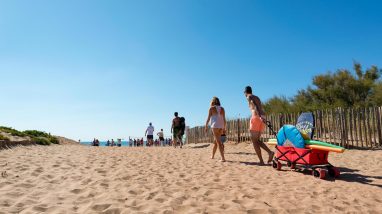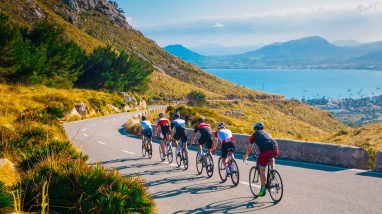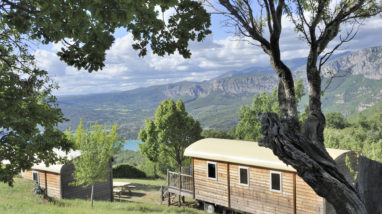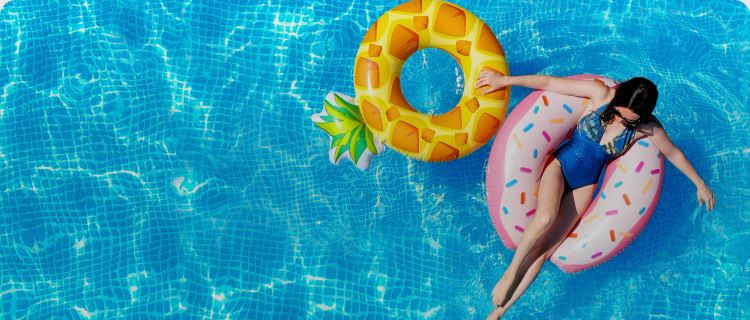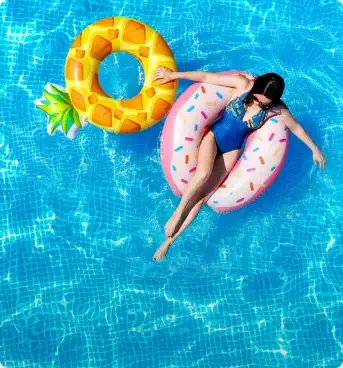Planning a camping trip to France doesn’t have to be a daunting task. At Campsited, we can help you narrow down your search quickly and easily.
It’s always good to know what to expect before you choose your desired campsite. Here’s some practical advice and tips for camping in France.
Camping Culture in France
French campsites, especially during the summer are filled with many visitors from Europe, mainly from the UK, the Netherlands, Germany and Spain.
There are many campsites in France that are family-friendly; they have kid clubs during the day, provide nightly entertainment for families, and plenty of other of activities to keep your family fully entertained for your stay. Or if you’re looking for that quiet campsite to relax and unwind, you’ll find the rural areas of France much more appealing. Again, it all depends on what you’re looking for in terms of booking the perfect camping holiday.
If you decide to bring your own tent, you can select options to have electricity at your desired pitch. There are many pitch sizes to choose from at French tent camping sites, some with more privacy than others, and others located near all the campsite activities, hot showers and bathrooms.
If you’re not into “roughing it” then renting a chalet is more of your camping style, with all the comforts of home provided to make your camping more like a “glamping” experience.
Size of France
France is the second-largest country in Europe occupying an area of 547,030 km², of which 3,427 km is beautiful coastline. The capital city Paris, in northern central France, includes world-renowned monuments like the Arc de Triomphe, the Eiffel Tower, Notre Dame Cathedral, and the Louvre Museum.
Currency in France
Euro € is the currency of choice at French campsites. Most stores and supermarkets in France accept MasterCard and Visa credit and debit cards. Cards from the UK and Ireland are accepted as long as they are a chip-embedded card. ATMs are easy to find at banks and shopping centres, however, check with your bank about withdrawal fees abroad.
Weather in France
Summer, (which runs from June through August in France) is the most popular time to visit. You can expect the weather in most towns and cities to be hot with temperatures averaging 23-26C. However, if you’re camping in higher elevations like the Alps or the Pyrenees, expect the summer months to be rainy.
Landscape
France is just a short trip from the UK and Ireland, the quick journey makes travelling with kids very easy. There are lots of different areas to explore and a variety of landscapes. From staying near a vineyard in Bordeaux to camping in the Pyrenees mountains, or camping near the beach in Cote D’Azur.
Language in France
While French is the official language of the country, there are a number of additional languages and dialects (like Breton, Alsatian, and Basque) that are spoken by its inhabitants.
Depending on where you are in France, most if not all campsites in the country are managed and run by English speaking professionals. So locating and communicating at your desired camping destination shouldn’t be a problem if you’re concerned about the language barrier.
Food in France
French cuisine is regarded as one of the best in the world and the culinary opportunities are endless. From eating fresh croissants for breakfast from the local boulangerie, sitting down for a three-star Michelin dinner, to drinking a glass of wine from a vineyard in Saint-Emilion, there is always something new to try. One of the highlights of camping in France is having hot fresh croissants at each campsite in the morning!
Healthcare
Bring a European Health Insurance Card (EHIC) with you as that will ensure reduced-cost healthcare coverage for any medical treatment while in France. Make sure to have a separate card for each family member – they’re free of cost and you can apply for one online.
Emergencies
The Universal European Emergency Number is 112, which gives access to the police, fire department, and ambulance services.
WiFi Access
Not all campsites have WiFi and if they do, there may be a charge for it and the signal may be patchy. We suggest checking with each campsite prior to your visit to make sure you can upgrade and purchase faster WiFi access; some offer full-day wifi access for a minimal rate.
Can I Take My Dog Camping in France
Dog-friendly campsites in France are quite easy to find. Campsites’ owners know how important a puppy is for a family and for this reason many campsites now accept dogs on site. It’s up to you to check what’s the policy of the campsite you’ve chosen.
It is also up to you to check that your dog is in place with the travel documents. To enter France with a dog you need the dog EU passport and your dog must be older than 15 weeks to be able to travel to France. A dog can enter to France after having been vaccinated against rabies treated for tapeworm; your dog has to be microchipped as well.
Have a look at the French Government website for a list of breeds that are prohibited from entering France.
Getting There
Getting to France is relatively straightforward and easy. If you plan to pitch a tent, rent a motorhome or book a chalet once you’re in France, then the quickest and easiest way would be to travel by plane or train.
Find the cheapest flights to France with Skyscanner, Momondo, or Google Flights: search by destination and the dates you’re traveling, to score a deal and get your camping trip to France started.
If you’re bringing your own camper/caravan, then there are plenty of ferries that leave from various ports in Europe with multiple daily crossings.
FerrySavers is a good website for checking and booking cheap ferries: just use the search engine by entering your outward and your return route and get the best price.
Camping in France doesn’t have to be a huge expense.
Driving in France
You can also bring your car over. Make sure your car insurance covers international driving before setting off. Also, using a mobile phone, even hands free, while driving is illegal.
Driving Laws in France
According to the official French Traffic Regulations, motorhomes can park in parking lots and streets for a maximum of seven days when a general parking permit sign is indicated, as long as it is not an obstacle to traffic or other drivers. The speed limit is 90 km/h on highways and 80 km/h on roads for cars with caravans weighing more than 3.5 tons.
Types of Campsites in France
Campsites in France are classified according to a star-rating system, from one star to five stars, like hotels, with five being the highest campsite rating based on the quality of facilities and campsite equipment provided.
On a general note, the ranking system for French campsites takes into consideration the following things:
- Sanitary equipment
- Safety and security
- The size of the land
- Languages spoken by staff
- Reception and staff availability
- Access for people with reduced mobility
- The infrastructures
- Environmental impact
Prices generally reflect the number of stars of the campsite but they can vary from season to season; when checking on a campsite in France, it is always advisable to check if the campsite you’ve chosen also caters for tents, caravans or mobile homes or if it only offers fixed accommodations for hire (chalets, bungalows, fixed caravans).
Star Rating for Campsites in France
The stars are defined by law as following:
- One-star campsites: small campsites, with very few facilities and extremely cheap, and a pitch over 70m².;
- Two-star campsites: a reception during the day, individual shower cubicles with hot water, individual washbasins, amenities for small electrical equipment, pitch over 70m².
- Three-star campsites: reception 24/7, reception in two foreign languages including English, tiled floors in washing areas, equipped children’s play areas, a wider range of services (Internet access, beverage dispenser…), pitch over 80m².
- Four-star campsites: private washing cubicles with hot water, dish-washing and clothes-washing sinks with hot water, pitches over 80m², tarred roads within the site, food stores on campsite or close by.
- Five-star campsites: a reception in 3 languages including English, compulsory swimming pool, Internet access, optional leisure services, pitch over 80m².
If you’re interested in glamping, stick to campsites with the highest rating – they’ll offer glamping domes, luxurious cabins, and bungalows usually complete with their own decks, private kitchens, dining areas, and bathrooms.
The best campsites in France are all-encompassing, offering amenities like indoor and outdoor pools, golf courses, lakes, outdoor activity areas with zip-lines, and even spas for the adults. We recommend booking these campsites in advance especially if you’re visiting France during the summer (July and August are the most popular months).
These are just the generic criteria used in the classification of campsites in France.
Choosing the Perfect French Campsite
Planning your camping holidays in France can be a fun experience because the country is extremely diverse; the northern, central, and southern regions of France offer different experiences and sites for travellers to discover.
Medieval castles and history
If your family is interested in medieval castles and history, then campsites located in the Loire Valley like Camping Sandaya Château des Marais or RCN le Moulin de la Pique in Dordogne are a great base to explore from. Or if you’re looking for active France camping holidays with your family, then the numerous French campsites such as Camping Qualité le Val de Saures located in Midi-Pyrenees are the perfect base for kayaking, hiking, or cycling.
Municipal Campsites in France
If you’re not looking for on-site activities, then a simpler campsite will suit you. Termed “camping municipal” in French, these simple French campsites are located in different regions – you can find them online at Camping Municipal (although it’s written in French). They’re available at a reasonable price, allow you to pitch a tent, and if you’re caravanning, they also have have spaces for caravans or motorhomes.
Farm & Vineyard Camping in France
There are over 600 farms throughout France that offer a program known as “Bienvenue à la Ferme.” It’s perfect for families that want to experience rural French countryside living while caravanning in France. The farms offer camping at a farmhouse along with educational programs such as milking the cows, learning how to make cheese, and you’re also given the opportunity to buy and eat fresh local farm produce. You can find the farms listed on Bienvenue A La Ferme.
How to find campsites in France
We recommend booking French campsites in advance especially if you’re visiting France during the summer (July and August are the most popular months).
At Campsited, we are here to help you find the perfect French campsite to suit your budget and camping style, ensuring your camping adventure in France will be an enjoyable and unforgettable experience.
With a variety of landscapes and climates for you to choose from, it is almost impossible to pick just one French campsite. We can help you explore the vast campsites in France like a pro, with suggestions and advice to get your holiday finalised and booked with ease.
There are over 11,000 campsites located throughout France that fit a variety of budgets and interests, and we are here to help you narrow down those choices to book an unforgettable vacation for the entire family.
Click here to start and book a great campsite for your next holiday in France.
Also, if you’re overwhelmed and need some advice on what and where to go in France, please get in touch through our online chat facility and we can help walk you through the process.
Your dream camping holiday in France is just a few clicks away
[Copyright cover picture: Camping Les Sablons]
